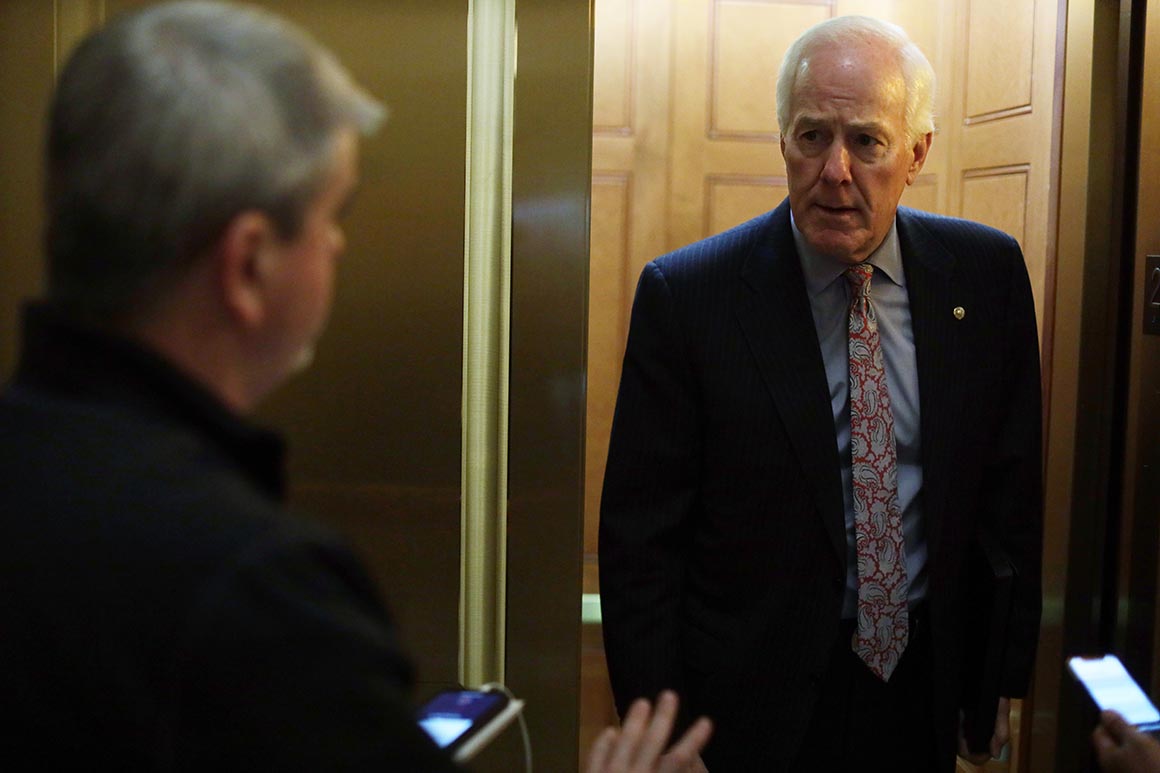
“I kind of assumed that once we had worked out a deal in the Senate that everybody was on board and it was just a matter of getting it done,” Sen. John Cornyn (R-Texas) said in an interview. “The House needs to get this done. If they can pass a $2 trillion bill by voice vote or unanimous consent they certainly could do this.”
„Even if you think that we need to have further debate and discussion, I don’t think leaving town without addressing it is the responsible thing to do,“ Cornyn added.
The Senate agreed by unanimous consent to a 77-day extension of the FISA provisions on March 16 in order to focus on the massive coronavirus package, allowing lawmakers to delay working out bigger differences they have with the law. They intend to vote on a series of amendments to the House’s bill, which passed on March 11, in the near future.
The provisions in the Foreign Intelligence Surveillance Act have been a source of controversy over the past several weeks in the House and Senate, with members of both parties divided over whether to change the law more broadly. Sens Rand Paul (R-Ky.) and Mike Lee (R-Utah) specifically sought greater reforms to the law enforcement’s surveillance authority.
“To me it seems reckless, quite honestly,” Sen. Kevin Cramer (R-N.D.) said of the House leaving with unfinished business. “The 77 days was sort of the perfect compromise and when you strike that balance to make it easy, frankly, for unanimous consent in both chambers, it’s frustrating that they didn’t call it up and it does put the work of the intelligence agencies at risk.”
But members of the Democrat-controlled House are pushing back vehemently against that criticism and argue that the House did its job by passing its own FISA compromise bill ahead of the March 15 deadline. The bill was negotiated by the House Judiciary and Intelligence committees and had the backing of House Minority Leader Kevin McCarthy.
“The House passed a very bipartisan FISA bill, which contained significant reforms increasing transparency, oversight and protections for civil liberties and privacy,” said Drew Hammill, a spokesman for Speaker Nancy Pelosi. “In spite of significant bipartisan support among senators for the House bill, Leader McConnell failed to take up the House bill and instead struck this risky delay deal in order to appease Senator Lee.”
Doug Andres, a spokesman for Senate Majority Leader Mitch McConnell, shot back in a statement: “There’s no way to spin it. Speaker Pelosi’s decision to let House leave without acting on a FISA extension was reckless.”
The House bill, which Senate leadership supports, would extend the surveillance programs mainly used by the FBI for three years, increase criminal penalties for FISA misuse and end the National Security Agency’s dormant call detail records program.
But by passing a temporary extension instead, the Senate needs the House to act. Separately, the Senate in the coming weeks is expected to take up the original House bill and hold votes on amendments to it, following through on an agreement with Lee.
Sens. Ron Wyden (D-Ore.) and Patrick Leahy (D-Vt.) also voiced concerns with the House-passed FISA bill.
Lee, in an interview, described the House’s decision to leave before the Senate extended the provisions as “right out of the establishment playbook.”
“You’ve got an expiring provision, you run up the clock as much as you can, you include some cosmetic changes in one house, then that house leaves town just days before the provisions are set to expire and then you present it as a binary up or down pass or fail option,” Lee said.
Lee added that the goal in asking for amendments was to have “a real open, honest debate and, if necessary, to extend these provisions on a short-term basis while we have one.”
Among the amendments senators are pushing for is one from Paul, who wants to prevent the FISA court from obtaining warrants on Americans.
The provisions’ expirations come amid a new report from the Justice Department’s inspector general, released Tuesday, that found systemic failures in FISA’s process for seeking a warrant. Among the areas the IG is looking into is the FBI’s decision to surveil Carter Page, who was an adviser to President Donald Trump’s 2016 campaign. Trump too has railed against FISA over the monitoring of Page.
Though the expiring provisions are unrelated, Republican proponents for reforming FISA have highlighted the Page incident to Trump to urge him against supporting a clean extension. The House FISA reform bill had support from Attorney General William Barr, but it was less clear whether Trump backed it. Trump tweeted that “many Republican senators” were urging him to veto the House bill. However, McCarthy told reporters Trump would sign the House bill.
Rep. Warren Davidson (R-Ohio), who co-sponsored an alternative reauthorization bill to the one passed by the full chamber, said in an interview that the latest IG report “highlights the sense of urgency that Congress should have” for making changes to the law and described the House bill as providing a “token” level of reform.
He argued the “worst case scenario” would be for no changes to be made to the Watergate-era law because some members of the intelligence community are OK with allowing the authorities to expire and will “go back and do all the same shit they planned on doing anyway.”
In a statement, Rep. Zoe Lofgren (D-Calif.), who successfully scuttled the mark-up of the House’s initial renewal bill, said that she is “hopeful” Congress will act to make significant changes to the law.
“The Constitution matters even during the pandemic,” she said.
Burgess Everett, Andrew Desiderio and Kyle Cheney contributed to this report.
Source: politico.com
See more here: news365.stream






